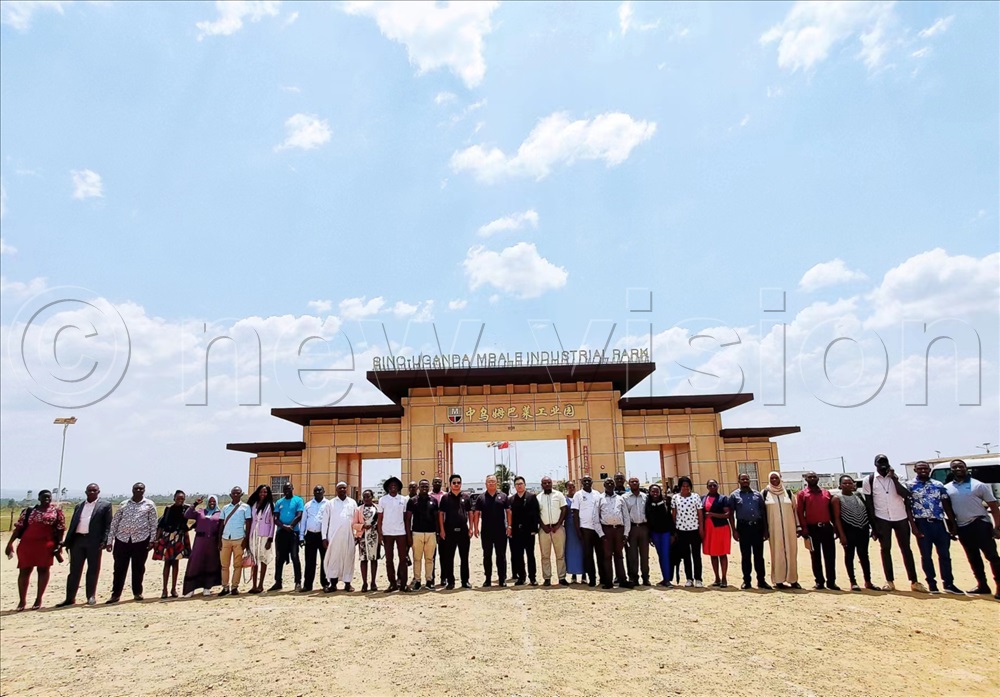By John Masaba
Over 5,000 students are set to benefit from a skills partnership program between Ugandan universities and Chinese firm, Uhome Ltd.
Under the deal announced last week, the program will commence with Makerere University Business (MUBS) and Uganda Young Men’s Christian Association (YMCA) before cascading to at least 30 other institutions in years to come.
Luke Wang, the Uhome Ltd co-founder and vice president, noted that the move is in a bid to increase the students’ employability and strengthen ties between Uganda and China.

Uhome Ltd, which is part of Tian Tang Group, makes a range of Ugandan-manufactured hi-tech goods including television sets, mobile phones and industrial internet things.
Most of the products are produced at the group’s industries located at the Sino-Uganda Industrial Park in Mbale.
“As part of the deal, Tian Tang and Uhome will jointly work with the institutions on a structured cooperation programme for the future entrepreneurship of these young people.
“This program can help students not only with the requisite skills but also nurture and create an equitable environment for their growth elsewhere in their own businesses or the job market,” Wang said.
He said the role of universities will be to mobilize students for skills training and jobs and facilitate resource persons from the universities to ensure the partnership becomes a success.
Uganda is one of the countries in the world grappling with high unemployment, with statistics from the Uganda Bureau of Statistics indicating that about 400,000 youths are released annually into the job market to compete for only about 9,000 available jobs.
Analysts say the high unemployment owes in part to Uganda’s highly theoretical education system, which offers students few hands-on skills, meaning many graduates are entering the job market with no employable skills.
“We want to increase the empowerment of young people, because my family has been the biggest beneficiary of President Museveni’s good leadership. So we want to give back from want we have got from Uganda,” he said.
Wang added: “We will also support those young people with skills to start their own business. They can work together with Uhome, and become our partners to do business in their hometowns. Uhome will be the platform to provide them with all the support including products, software, marketing and sales service training, etc.”
Wang announced the deal last week at the Sino-Uganda Industrial Park in Mbale as the firm opened the facility to lecturers, journalists and the general public, as part of its plan to update the country on the progress so far made to develop the park.
One of the eight industrial parks operated by the government, 619-acre complex is home to more than a dozen factories producing a wide range of products including electronics, beddings and security products.
President Museveni launched the park in 2020. He said the facility would create at least 15,000 jobs over a five-year period.
Wang said in addition to the partnership with universities, they are also working to increase further employment opportunities for the local community in Mbale by opening more than 10 factories within the year of textiles, t-shirts, jeans, steel products and other products related to people’s daily life.
“Uhome stands for Uganda home, which means we are going to provide the best quality and most affordable price home products, all the products that Uganda people need will be made in Uganda, in Mbale Industrial Park, and we shall reach the goal of helping people’s home and life with Uhome,” Wang said.
He added that their focus is on creating an industrial ecology themed on a Home with three main home product fields — textiles and knitting, electrical appliances and electronics, furniture and home furnishing.
Conducive investment environment
He thanked the government of Uganda for providing a conducive environment for foreign investments, noting that without it, their business establishments would have struggled.
He revealed that due to the good business climate in Uganda, several Chinese investors have been pushing to set up shops in Uganda and more are expected in the years to come.
He cited Lida Garments, which has operated in Ethiopia for decades, but has decided to relocate to Uganda.
“They want to produce at least five million jeans a year,” he said, adding: “They will be ready in the market by June. Our target is for them to use local materials, including cotton so as to benefit our local Ugandan farmers.”
He explained that the investor is setting up in Mbale and is expected to create at least 5,000 jobs.
‘Thank you’
Evelyn Anite, the Minister of State Privatization and Investment hailed the development as a positive step in China-Uganda relations.
“I am happy for my country and for Paul Zhang (chairman of Tian Tang) for ensuring that our people don’t lose jobs,” she said.
“Even as they recover (from Covid-19), it is not easy, but at least we have been able to see something on the ground because they are now making mobile phones and many other electronics. Where others would have left, they have chosen to stay and help develop our country. Thank you, Zhang for your resilience and strategic thinking.”
Ahmed Wafidi, the secretary for education at the Mbale City Industrial division, hailed Uhome for accelerating local development.
“When the President said he was bringing an industrial park to Mbale in 2020, we were one of the cities that were lagging in terms of factories and employment. When they (investors) came, as Mbale we have benefited; our communities here are employed and they can put food on the table for their families. As a local government, we are also benefiting. We have many tax levies including social service tax and property tax,” he said.

